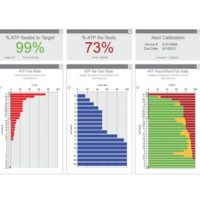Adenosine triphosphate (ATP) sanitation verification systems are now the standard method for evaluating and monitoring sanitation efficacy at food production and foodservice organizations around the world.
Neogen has developed an innovative software system that allows food safety directors immediate access to their facilities’ sanitation test results from an AOAC-approved test method—no matter where in the world their facilities may be.
Neogen’s NeoNet® is a cloud-based software platform that enables corporate food safety directors to achieve new levels of access, insight, and control of the effectiveness of the sanitation programs at each of their facilities. With the NeoNet system, each facility does routine ATP testing and seamlessly transfers the results to their local computer networks. The data are then automatically synced to the customer’s universal NeoNet system.
“Corporate quality assurance and sanitation directors have needed a way to quickly learn of potential problems and compare results across facilities, as well as production groups and equipment within those facilities,” says Neogen’s James Topper. “Especially for organizations that have multiple, far-flung facilities, the challenge has been to efficiently collect and interpret that data company-wide. NeoNet greatly simplifies that process by presenting the collected data graphically without having to conduct extensive data analysis. This simplified process enables directors to respond more quickly to situations that need their immediate attention—and potentially save their companies from the consequences of an ineffective sanitation effort.”
Using NeoNet with Neogen’s AOAC-approved AccuPoint® Advanced test system, a director can review results of each facility’s testing or compare one facility with all other locations. It also provides historic ATP test result comparisons to current results. At each level, the results are displayed with a bar chart and percentages of pass, marginal, and fail results ranked by highest fail percent. Users can narrow the results to a selected timeframe, such as the past 24 hours, or by the week, month, quarter, or year.
“We’ve been very encouraged by the feedback we’ve received from companies that have been early adopters of the NeoNet system,” says Topper. “They’ve found it to be very easy to use, and it accomplishes what the industry requested.”
The First ATP Test System with AOAC Approval
Neogen’s AccuPoint Advanced was the first sanitation monitoring system to receive AOAC approval, and this approval follows a recent study by NSF International that showed AccuPoint Advanced exceeded the performance of competitive systems.
“Each time we receive a validation from an independent third party on any of our tests, it provides further assurance to the food production and processing industry that our tests perform as expected,” says Topper. “The performance of our AccuPoint Advanced system in recent independent evaluations by AOAC and NSF is very gratifying. We developed the product with the goal of creating a new sanitation monitoring system that is superior to anything else on the market.”
The results in the AOAC validation report (Performance Tested MethodSM 091601) provided evidence that AccuPoint Advanced produces consistent and reliable data for evaluating sanitation program effectiveness in food processing and foodservice facilities.
AccuPoint Advanced is an enhanced version of the company’s earlier AccuPoint test system. Improvements with AccuPoint Advanced include improved sampler chemistry to produce more consistent results with even greater sensitivity; an enhanced instrument to produce even faster results (less than 20 seconds); and advanced data manager software to easily streamline the testing process by creating test plans and syncing important data, while keeping a permanent record of sanitation test results.
AOAC International is a globally recognized, independent forum for finding appropriate science-based solutions through the development of microbiological and chemical standards. The Applied Research Center at NSF International is a not-for-profit global research group that provides product development support to manufacturers and developers of products in the food safety, agriculture, clinical, and life science markets.
In the NSF International study, a battery of tests was conducted to objectively measure five major commercial ATP hygiene monitoring systems. In real-world simulations, each system was tested using four different approaches to determine their accuracy and consistency. Accuracy was determined by measuring the percent recovery of the commodity from a 4 inch × 4 inch stainless steel surface. A higher relative light unit score on this measure indicated a more accurate representation of the residue actually present on a surface. Consistency was determined by computing the coefficient of variation (CV%) for the sample set. A lower CV% indicated a more narrow range of scores for a given sample and, therefore, a more consistent system.
Across all real-world test simulations, AccuPoint Advanced appeared to be more consistent and accurate in its detection of the amount of ATP on a surface with its patented flat-head samplers. In a production environment, more accurate and consistent results mean more reliable data.
www.foodsafety.neogen.com




